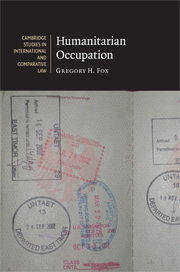Book contents
- Frontmatter
- Contents
- Acknowledgments
- Introduction
- Section I Historical antecedents
- 1 The historical origins of humanitarian occupation I: governance in service of outsiders
- 2 Historical origins of humanitarian occupation II: internationalized territory in service of insiders
- 3 Full international governance
- Section II Why humanitarian occupation?
- Section III Legal justifications
- Conclusions
- Index
- CAMBRIDGE STUDIES IN INTERNATIONAL AND COMPARATIVE LAW
1 - The historical origins of humanitarian occupation I: governance in service of outsiders
Published online by Cambridge University Press: 02 February 2010
- Frontmatter
- Contents
- Acknowledgments
- Introduction
- Section I Historical antecedents
- 1 The historical origins of humanitarian occupation I: governance in service of outsiders
- 2 Historical origins of humanitarian occupation II: internationalized territory in service of insiders
- 3 Full international governance
- Section II Why humanitarian occupation?
- Section III Legal justifications
- Conclusions
- Index
- CAMBRIDGE STUDIES IN INTERNATIONAL AND COMPARATIVE LAW
Summary
Some writers have described a long historical pedigree for the humanitarian occupation missions of the 1990s. Beginning in the early nineteenth century, the dominant states of Europe entered into a series of multilateral agreements providing that certain governmental powers would be exercised directly by international actors. In the twentieth century, the mandate and trusteeship systems of the League of Nations and United Nations created supervisory regimes over the former colonies of defeated powers. And after the end of the Cold War, the UN dispatched numerous missions to rebuild the governments of post-conflict states.
In this chapter, examining cases running through the creation of the UN trusteeship system, I will begin to ask whether this historical perspective is of any use to understanding contemporary humanitarian occupations. Can these early cases be understood as representing a coherent legal phenomenon? Were governmental functions internationalized in the same way? Did internationalization occur for the same reasons? Most previous scholarship has focused on the extent of international control over these early territories. I am interested in how these international territories were governed and whether they represented an idealized model, normative or otherwise, of legitimate national governance. More particularly, was governance internationalized primarily for the benefit of the inhabitants – or was it done for other reasons? I will argue that if the welfare of the inhabitants was not the primary reason for internationalization, then humanitarian occupation represents not continuity with past practice but a crucially important deviation.
Meir Ydit's 1961 study remains the most comprehensive historical review of international territorial administration.
- Type
- Chapter
- Information
- Humanitarian Occupation , pp. 17 - 40Publisher: Cambridge University PressPrint publication year: 2008



